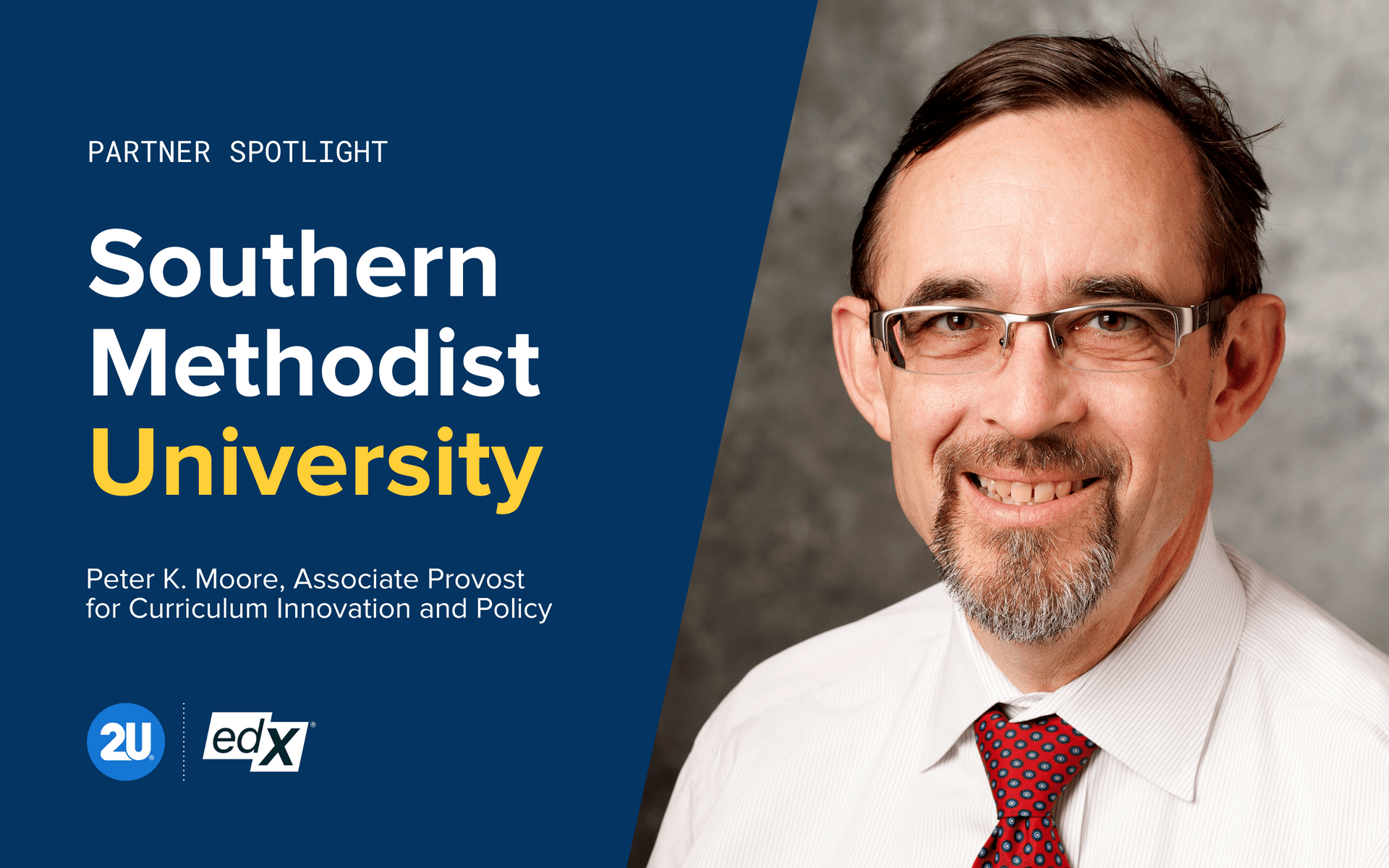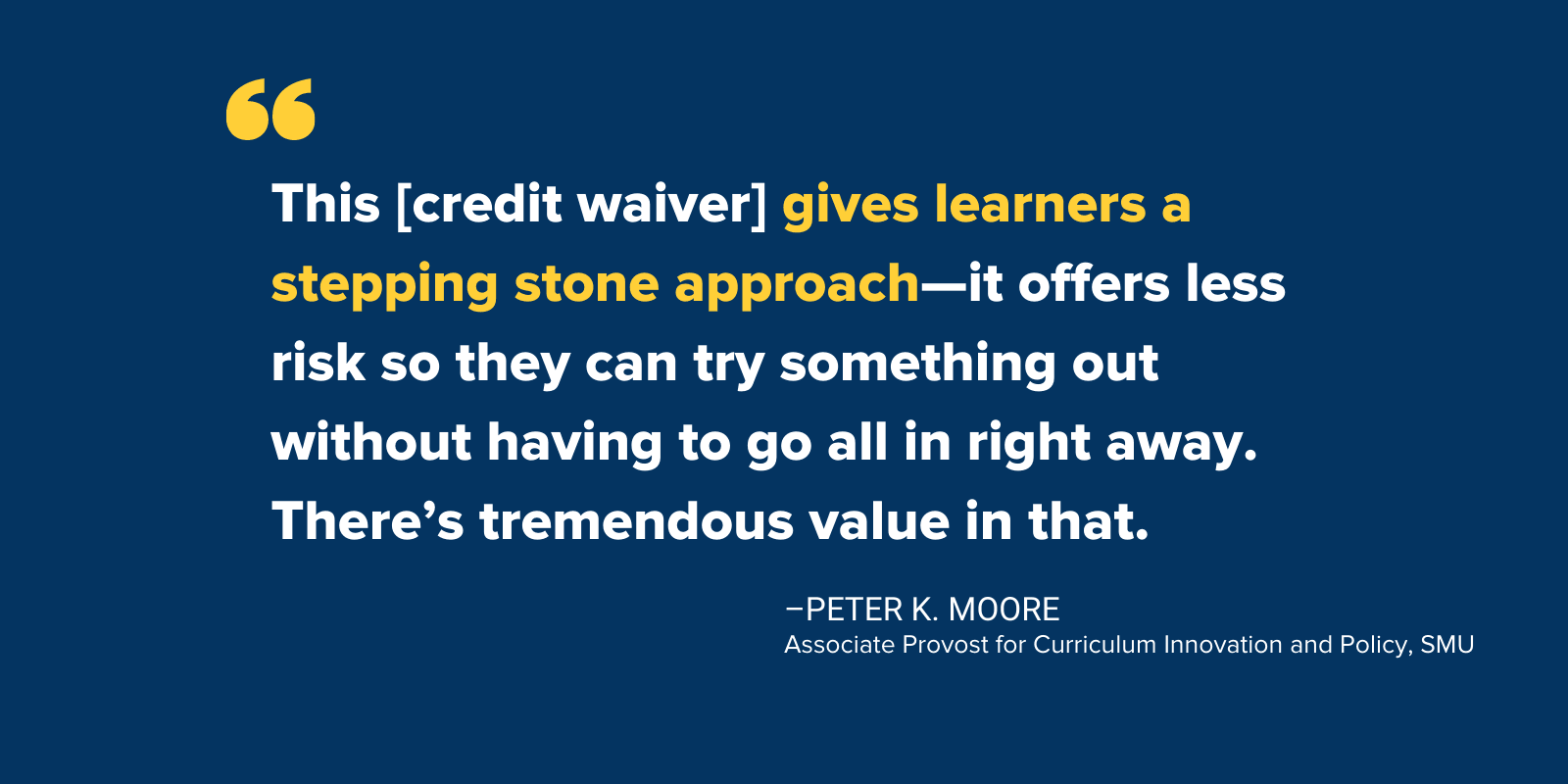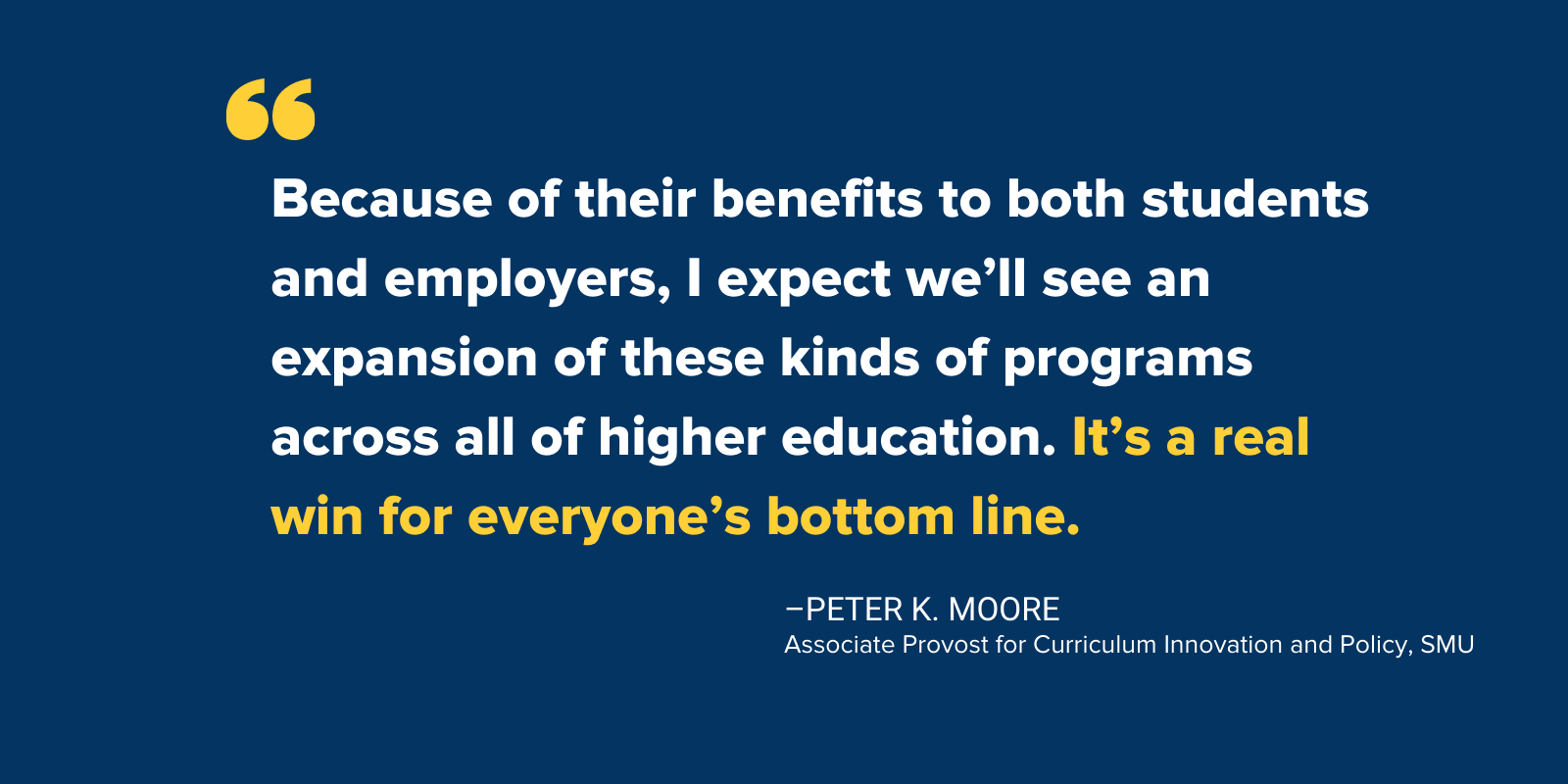Partner Spotlight
Why SMU Is Embracing the Power of Stackable Learning with a New Boot Camp Credit Waiver
Written by Andrew Hermalyn on Feb 8, 2022
Related content: Higher Education, Graduate Programs, Boot Camps

The way Southern Methodist University’s Associate Provost for Curricular Innovation and Policy Peter K. Moore sees it, stackable learning is synonymous with optimum flexibility.
“Simply put,” Moore says, “a stackable framework—where students springboard from one incremental level of learning to the next, acquiring knowledge and credentials of increasing value and complexity—lets learners account and adjust for so many factors: changing educational goals, shifting financial realities, and their own evolving life experiences.”
Beginning with its Data Science Boot Camp cohort this spring, Southern Methodist University (SMU) is putting the power of stackable learning into the hands of students with a new credit waiver initiative. The waiver offers learners who previously earned a bachelor’s degree the ability to apply for credit toward SMU’s online Master of Science in Data Science (MSDS) program upon completion of the boot camp.
As the president of partnerships at 2U, I recently connected with Moore to discuss how 2U and SMU are mission-aligned in recognizing the need for innovative and affordability-minded educational programs, like this new credit waiver, that serve the evolving needs of learners and employers.
A Natural Segue from Boot Camp to Online Master’s Degree
“The way we’re rolling this out at the start, students can apply for up to six credits toward the online MSDS,” Moore says. “As part of that application process, faculty members from the master’s program evaluate a student’s entire body of work from the boot camp, ranging from homework assignments to their capstone portfolio project to the recommendation from their instructor. If they’re approved, the credit waiver enables them to save both time and money; there’s just no reason for students to do and pay for things twice.”
To SMU, the online MSDS program was a natural fit for the launch of this new credit waiver option. Many of the concepts covered in SMU’s Data Science Boot Camp feed organically into the initial courses of the master’s program.
“Giving students the ability to get their feet wet in the boot camp before committing to a full master’s degree—and then giving them the opportunity to apply for credit toward the MSDS if they decide to go further—is just one of the many ways that SMU is helping students craft their own educational path,” Moore says.

A Stepping Stone Approach to Mastery and Opportunity
Two years ago, the pandemic required virtually every institution of higher learning to move to digital instruction. But at SMU, high-quality online education has been an important element of its ongoing strategic plan for several years.
“There’s no going back for any of us after COVID,” Moore says. “Digital will be with us in some way, shape, and form moving forward. Along this trajectory, we’re seeing more and more U.S. universities offering credit for prior learning. The idea of helping students build up knowledge and credentials in incremental steps along the way fits right into SMU’s digital strategy.”
In endorsing the many benefits of modular and stackable frameworks for learning, however, Moore is quick to state that doesn’t mean full degree programs are any less relevant or worthwhile.
“Generally among employers, degrees still hold a higher value as a credential,” he stresses. “Students who choose the path from boot camp to master’s degree will generally find themselves having even more opportunities going forward, whether it’s at the company they're with or another employer. This set-up just gives learners a stepping stone approach—it offers less risk so they can try something out without having to go all in right away. There’s tremendous value in that.”
A More Cost-Effective Way to Support Employee Education
Given the ever-growing imperative to hire, train, and retain skilled tech professionals within their organizations, employers can also benefit from stackable learning frameworks like SMU’s boot camp credit waiver—especially right now during what many are referring to as the “Great Resignation.” People are leaving their jobs in record numbers, with many citing that they feel unsupported or no longer see opportunities for growth. Stackable learning provides non-traditional pathways to lifelong learning, which shows workers how invested their employers are in upskilling and professional development.
“Credit waivers save employers time and money, too,” Moore says. “Rather than covering expenses toward a full degree, employers can let their workers explore data science learning with a boot camp at a more moderate cost—and make sure that’s what an employee wants, feels comfortable in, and is willing to commit to first. Because of their benefits to both students and employers, I expect we’ll see an expansion of these kinds of programs across all of higher education. It’s a real win for everyone’s bottom line.”
Considering how rapidly changing the working world has become, these bottom-line advantages are even more critical for the future. The fast pace of technology demands a constant, steady finger on the pulse of the latest tools and solutions.

“Particularly with data science, I anticipate even students with master's degrees will need to upscale their skill set in a couple of years in order to keep up with new advances,” Moore says. “In addition to putting boot camps before master’s programs in a stackable learning framework, I see a lot of value in placing them on the ‘backend’ as well.”
The programming language Python is a prime example of the need to affordably stack the backend of a master’s degree. Even just a couple of years ago, Python wasn’t what it is today—and staying up to speed on all the ways it integrates with more recent and upcoming systems comes with its own set of challenges.
“Python has changed so quickly and radically that a lot of data science professionals are wanting to brush up on it, “Moore explains. “In continuing to explore innovative access points into lifelong learning, I’m eager to see how SMU can help upskill students who completed our MSDS program five or six years ago in an affordable way. A data science course today looks very different from the same one from five years ago. I think this is compelling graduates to want to come back and update their knowledge with the latest technologies.”
More Learning Options, More Flexible Pathways
The last two years have been massively disruptive for students, universities, employers, and employees alike. Collectively, it’s clear that learners and workers have a heightened desire to have several educational options on the table, to keep them as adaptable and competitive as possible.
“There will always be an interest in on-campus learning and degree programs for many students and their families, but boot camps and online degrees will continue to be important ingredients as well,” Moore says. “Many other changing demographic factors—like Baby Boomers looking to remain financially viable by learning new skills until they can retire—tells me that stackable learning will become a more significant component of higher education going forward.”
“It’s great for students to have the level of flexibility that our new credit waiver opportunity initiates,” Moore continues. “And it’s great for employers seeking more cost-effective ways to keep their workers equipped with the skills that meet their business needs. My hope is that we can expand this concept to a number of other programs within the university. There are a lot of opportunities at SMU we’re just on the verge of exploring.”
Latest.
Learn more about us.
At 2U, we’re on a mission—to eliminate the back row in higher education and help partners thrive in the digital age. To learn more about who we are and what we do, follow the links below.